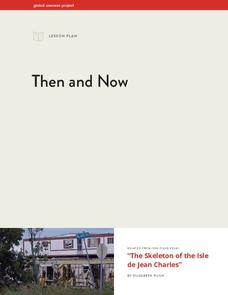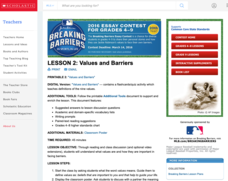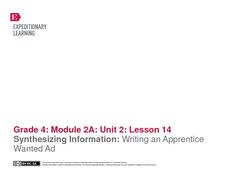Historical Thinking Matters
Spanish-American War: 3 Day Lesson
Why did the United States choose to invade Cuba in 1898? As part of a 3-day lesson, your young historians will first develop working hypotheses to answer this question, then work with a variety of historical primary source documents that...
Council for Economic Education
Federal Budget Lesson Plan and Fiscal Ship Student Game
The federal budget has never been so fun! Using an interactive game, high schoolers choose from a variety of policy options after identifying goals and try to balance these changes in policy with a federal budget.
Heritage Foundation
Procedural Amendments: Amendments III, IV, and V
So many US Constitution clauses, so little time. The 17th installment in a 20-part series teaches pupils about the Third, Fourth, and Fifth Amendments. Learning through activities such as group work, connecting to current events, and...
PBS
Lessons in Leadership, Roosevelt Style
It's easy to criticize those in power until you're sitting at their desk, faced with the same decisions. A history lesson prompts secondary learners to research the Roosevelt presidencies through the lens of leadership and...
Curated OER
Creative Homework Assignments Can Motivate Students
Teachers can make homework more meaningful by giving students interesting and motivating assignments.
Global Oneness Project
A Collapsing City Skyline
Have your high schoolers learn about the modern history of Myanmar by close-reading an article about the city and people of the city Yangon. As they'll learn, the country is going through some dramatic transitions. After...
Federal Reserve Bank
Glo Goes Shopping
Making decisions can be very difficult. Show your class one way to evaluate choices with this lesson, which is inspired by the book Glo Goes Shopping. Learners practicing using a decision-making grid with the content of the story and a...
Film English
The Conditioned
Discover the lovely story of Raimundo Arruda Sobrinho with your class. Over the course of the activity, pupils practice descriptive writing, write short narratives, collaborate in small groups, watch a powerful short film about Raimundo,...
Smithsonian Institution
Mobilizing Children
Scholars find out how the government used propaganda to mobilize children to help in the war effort. Lesson exercises include analyzing a quote from Franklin Roosevelt, viewing propaganda images and posters, and participating in a lively...
National History Day
More Than Mud and Cooties: The Poetry of World War I Soldiers
Poetry is not just for romance. Teach middle schoolers about soldiers' experiences during World War I with poetry written by the soldiers themselves. The lesson includes a simulation activity, a graphic organizer activity, and a...
Core Knowledge Foundation
Different Lands, Similar Stories Tell It Again!™ Read-Aloud Anthology
A read-aloud anthology highlights how one story differs depending on where it comes from. Scholars listen carefully to familiar and new stories, participate in discussions, and complete word work practice. Extensions for each lesson...
Teaching Tolerance
Racial Disparity in the Criminal Justice System
Explore the impact of the war on drugs in a thought-provoking lesson for high school academics. Young historians delve into the world of the criminal justice system and the racial disparity that occurs in the US. The resource provides...
PBS
Master of the Airwaves: How FDR Used Radio to Ease the Public’s Fears
The political and economic climate during the 1930's was uncertain and tumultuous. But Americans' minds and hearts were eased with the reassuring words of their president, Franklin D. Roosevelt, and addresses over the radio. High...
Heritage Foundation
The Constitution, Federalism, and the States
The divide between federal and state government is responsible for much of tension that continues to this day, partly because of the US Constitution. The activities in the 14th lesson in a series of 20 are designed to help learners...
Heritage Foundation
Congress's Territorial Powers, Implied Powers, Citizenship, and the Bureaucracy
An informative resource gives scholars a look into why the US Constitution placed certain federal powers over that of the state. A variety of activities about constitutional clauses helps to create meaningful learning.
Constitutional Rights Foundation
How the First State Constitutions Helped Build the U.S. Constitution
Did you know that the United States Constitution was adopted after many state constitutions were already in place? Young scholars examine facts about the influence of states through an informative and interesting resource. Groups then...
US Institute of Peace
Responding to Conflict: Negotiation—Identifying Wants and Needs
Let's make a deal! Are real negotiations as simple as they are in the game show? Scholars learn the art of negotiation during the 8th lesson in a series of 15. The activity kicks off with a fun group negotiation, then explores the topic...
National Park Service
The Power of Remembrance
On every July 4th, we watch fireworks and celebrate our independence, but how is the history of the American Revolution preserved? Four social studies lesson guide learners through different memorials, commemorative objects, and restored...
Global Oneness Project
Then and Now
The devastating changes happening to the Native American inhabitants of an island off the coast of Louisiana are the topic of an informational lesson. After scholars break into groups to explore particular topics, they come back together...
Scholastic
Lesson 2: Values and Barriers
Scholars investigate and discuss the importance of values and how they can be used to break barriers. Small groups work collaboratively to examine the text and draw inferences to answer questions. A writing assignment challenges pupils...
Learning to Give
Why Volunteer?
Inspire scholars to volunteer their time to make a positive change in their community. With help from research, a public speaker, and reflection, learners define and asses what it takes to be a volunteer in a business, non-profit,...
EngageNY
Mid-Unit 2 Assessment: Inferring About the Silversmith Trade in Colonial Times
The seventh lesson plan in this unit on colonial trade assesses fourth graders' ability to use details from an informational text to make inferences and create a piece of informative writing. The included assessment begins with learners...
University of Chicago
Exercise in Conflict Resolution
How do major religions, including Judaism, Christianity, and Islam, differ in how they view the role of individual freedoms within society, the definition of morality, and the importance of politically satisfying the greater...
EngageNY
Synthesizing Information: Writing an Apprentice Wanted Ad
Fourth graders view examples of help-wanted ads as they plan and create their own writing in the fourteenth instructional activity of this unit on colonial trade. The engagement of the class is captured when the teacher shares an actual...























